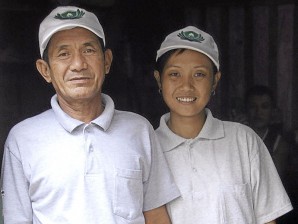
WITH only daughter Cezarine: Before he became a carpenter, Grefal was a tricycle driver, construction worker, gravedigger and a factory worker. CONTRIBUTED PHOTO
Every morning before he goes to work, 57-year-old Carlito Grefal neatly tucks in his gray uniform shirt and wears his white cap with pride.
A carpenter, Grefal proudly admits that he is a survivor of two big events in his life: Tropical Storm “Ondoy” in 2009 which left him with tragic memories, and his addiction to alcohol.
Grefal, known in his neighborhood of Barangay Nangka in Marikina City as “Mang Carlet” initially could not admit he was an alcoholic.
The carpenter had been drawn to the bottle for the past 40 years, drinking three to five days in a week since he was a 16-year-old teenager.
“I would drink through the night, then sleep. I’d wake up to drink again,” he said.
His drinking problem often led to arguments between him and his only daughter Cezarine, now 29 and married.
Cezarine recounted a night when she was still toddler, her father so drunk he had to sleep inside a tricycle.
“But he would still hug me and not leave me alone,” Cezarine said.
Grefal was a jack-of-all trades, but he would lose one job after another because of his addiction. The difficult part was in between when he was jobless and consequently, penniless.
Before he became a carpenter, Grefal was once a tricycle driver, a construction worker, a gravedigger and a factory worker.
Once, heavily intoxicated, he took out his tricycle to look for passengers.
“The tricycle crashed into a concrete post. I got fired afterwards because the passenger told my boss I was asleep while driving,” he said.
His love for alcohol did not diminish even when his wife died of heard attack in 2007.
Things only changed for Grefal after that fateful day of Sept. 29, 2009, when Ondoy unleashed floodwaters that ravaged most houses not only in Marikina but in most parts of Metro Manila.
Reminders of that grim day—friends and kin losing lives and homes—still haunt him.
At the height of the flood, Grefal stood on his neighbor’s roof, surveying the drama below, floodwaters rampaging from the Nangka River and submerging his wooden, two-story house.
He had saved nothing except the clothes on him.
During the interview, Cezarine was cooking their lunch over charcoal and fanning the fire. “We haven’t bought a new stove after Ondoy,” she said.
“Blessing pa nga. Parang gusto namin magpasalamat sa Ondoy (It’s indeed a blessing. We felt thankful for what Ondoy had done),” he said with a chuckle.
Without Ondoy, Grefal said he would not have been able to know about the Tzu Chi Foundation, a relief organization, and be part of it. More important, he would not have been able to abandon his longtime vice.
A few days after the flood subsided, Tzu Chi volunteers came to their area with a simple instruction to the residents: They would receive P400 a day if they would clean up their own house and help the others do the same.
The carpenter immediately signed up for the job, and used the money he earned to buy new clothes and other basic necessities.
But his involvement did not end that week. He was hired by Tzu Chi to do carpentry work in a city housing project for P250 a day.
“At first, I thought it was just an ordinary job. But as the days passed, I felt a sense of happiness helping the group,” he said.
Then, the unusual happened. He gave up his nightly drinking sessions so he could be up and about the following day to devote most of his time for the foundation. On his rest days, he played basketball or biked around the city to ward off thoughts of going back to his drinking habit.
“I realized how important my body was and what I could do with it,” he said. Apart from doing carpentry on weekdays, Grefal volunteers to work on relief activities and house construction in various depressed communities every Sunday.
Grefal said he derives fulfillment from building a house. “I keep thinking that four of five people will soon be living there and that their lives would improve.”
His goal now is to save money so he can repair his small house before another big typhoon hits the city.
For Grefal, Tzu Chi was heaven-sent.
One of the largest volunteer-based nongovernment organizations in Asia founded by dharma master Cheng Yen in Taiwan, it initiates outreach programs and builds hospitals, houses and schools for the poor and disaster victims.
It forbids, among other things, stealing, lying, smoking, gambling and drinking alcohol.
“It seemed my father took these precepts to heart,” Cezarine said.